

African Centered Schooling: Facilitating Holistic Excellence for Black Children - viewcontent.cgi. Teaching Diverse Learners. 6.
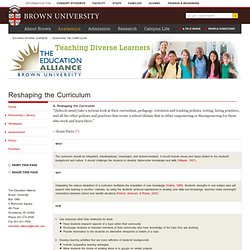
Reshaping the Curriculum "[Schools must] take a serious look at their curriculum, pedagogy, retention and tracking policies, testing, hiring practices, and all the other policies and practices that create a school climate that is either empowering or disempowering for those who work and learn there. " -- Sonia Nieto (*) References. Student-Centered Instruction. 4.

Student-Centered Instruction "In our multicultural society, culturally responsive teaching reflects democracy at its highest level. [It] means doing whatever it takes to ensure that every child is achieving and ever moving toward realizing her or his potential. " Learning Within the Context of Culture. 3.
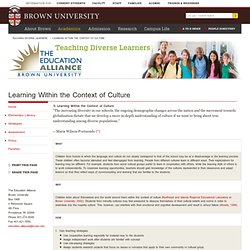
Learning Within the Context of Culture "The increasing diversity in our schools, the ongoing demographic changes across the nation and the movement towards globalization dictate that we develop a more in-depth understanding of culture if we want to bring about true understanding among diverse populations. " Elementary Genocide » A Controversial Film About the School-to-Prison Pipeline. School-to-prison pipeline. The term "school-to-prison pipeline" is a phrase that is used by education reform activists and organizations such as the American Civil Liberties Union (ACLU),[1] the Justice Policy Center, Advancement Project,[2] and the New York Civil Liberties Union (NYCLU)[3] to describe what they view as a widespread pattern in the United States of pushing students, especially those who are already at a disadvantage, out of school and into the American criminal justice system.
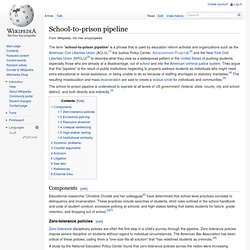
They argue that this "pipeline" is the result of public institutions neglecting to properly address students as individuals who might need extra educational or social assistance, or being unable to do so because of staffing shortages or statutory mandates.[4] The resulting miseducation and mass incarceration are said to create a vicious circle for individuals and communities.[5] Components[edit] Zero-tolerance policies[edit] Excessive policing[edit] Resource diversion[edit] Ashford University Library. Cultural imperialism. Cultural imperialism is defined as the cultural aspects of imperialism.
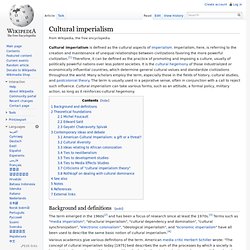
Imperialism, here, is referring to the creation and maintenance of unequal relationships between civilizations favoring the more powerful civilization.[1] Therefore, it can be defined as the practice of promoting and imposing a culture, usually of politically powerful nations over less potent societies. It is the cultural hegemony of those industrialized or economically influential countries, which determine general cultural values and standardize civilizations throughout the world. Many scholars employ the term, especially those in the fields of history, cultural studies, and postcolonial theory. The term is usually used in a pejorative sense, often in conjunction with a call to reject such influence. White Supremacy Culture. From Dismantling Racism: A Workbook for Social Change Groups, by Kenneth Jones and Tema Okun, ChangeWork, 2001 This is a list of characteristics of white supremacy culture which show up in our organizations.
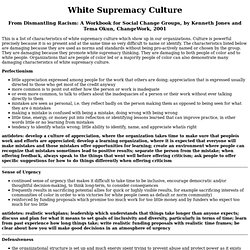
Culture is powerful precisely because it is so present and at the same time so very difficult to name or identify. The characteristics listed below are damaging because they are used as norms and standards without being pro-actively named or chosen by the group. They are damaging because they promote white supremacy thinking. Electronic colonialism. Electronic colonialism theory was first started by Tom McPhail, a Canadian who began his career with Marshall McLuhan.
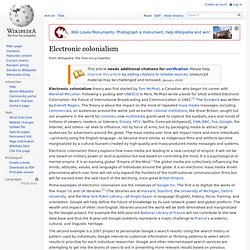
Following a posting with UNESCO in Paris, McPhail wrote a book for SAGE entitled Electronic Colonialism: the Future of International Broadcasting and Communication in 1981.[1] The foreword was written by Everett Rogers. The theory is about the impact on the mind of repeated mass media messages, including commercials, on audiences around the world. Hegemony. In the 19th century, hegemony came to denote the "Social or cultural predominance or ascendancy; predominance by one group within a society or milieu".

Later, it could be used to mean "a group or regime which exerts undue influence within a society. "[7] Also, it could be used for the geopolitical and the cultural predominance of one country over others; from which was derived hegemonism, as in the idea that the Great Powers meant to establish European hegemony over Asia and Africa.[8] The Marxist theory of cultural hegemony, associated particularly with Antonio Gramsci, is the idea that the ruling class can manipulate the value system and mores of a society, so that their view becomes the world view (Weltanschauung): in Terry Eagleton's words, 'Gramsci normally uses the word hegemony to mean the ways in which a governing power wins consent to its rule from those it subjugates'.[9] Etymology.
School-to-prison pipeline. The term "school-to-prison pipeline" is a phrase that is used by education reform activists and organizations such as the American Civil Liberties Union (ACLU),[1] the Justice Policy Center, Advancement Project,[2] and the New York Civil Liberties Union (NYCLU)[3] to describe what they view as a widespread pattern in the United States of pushing students, especially those who are already at a disadvantage, out of school and into the American criminal justice system.

They argue that this "pipeline" is the result of public institutions being neglectful or derelict in properly addressing students as individuals who might need extra educational or social assistance, or being unable to do so because of staffing shortages or statutory mandates.[4] The resulting miseducation and mass incarceration are said to create a vicious circle for individuals and communities.[5] Components[edit] Zero-tolerance policies[edit] Excessive policing[edit] High-stakes testing[edit] Critical race theory. The movement is loosely unified by two common themes.
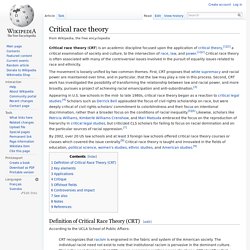
First, CRT proposes that white supremacy and racial power are maintained over time, and in particular, that the law may play a role in this process. Second, CRT work has investigated the possibility of transforming the relationship between law and racial power, and more broadly, pursues a project of achieving racial emancipation and anti-subordination.[3] NONE. NONE. NONE. Postcolonialism. Colonialism background[edit] In La Réforme intellectuelle et morale (1871), the Orientalist Joseph-Ernest Renan, advocated imperial stewardship for civilising the non–Western peoples of the world. Colonialism was presented as “the extension of Civilization”, which ideologically justified the self-ascribed superiority (racial and cultural) of the European Western World over the non-Western world, which Joseph-Ernest Renan espoused in La Réforme intellectuel et morale (1871), whereby imperial stewardship would effect the intellectual and moral reformation of the coloured peoples of the lesser cultures of the world.
That such a divinely established, natural harmony among the human races of the world would be possible, because everyone — colonizer and colonized — has an assigned cultural identity, a social place, and an economic role within an imperial colony; thus: Ashford University Library. Maslow's hierarchy of needs. Culturally Responsive Teaching. Ashford University Library. A Visibility Project: Learning to See How Preservice Teachers Take Up Culturally Responsive Pedagogy - ProQuest. Ashford University Library. Fully Functioning Person - Carl Rogers Psychology Definition. Definition: According to Carl Rogers, a fully functioning person is one who is in touch with his or her deepest and innermost feelings and desires. These individuals understand their own emotions and place a deep trust in their own instincts and urges. Unconditional positive regard plays an essential role in becoming a fully functioning person.
Rogers suggested that people have an actualizing tendency, or a need to achieve their full potential – a concept that is often referred to as self-actualization. Rogers believed that a fully-functioning person is an individual who is continually working toward becoming self-actualized. Fully Functioning Person - Carl Rogers Psychology Definition. What Are Peak Experiences? - Psychology Overview. Answer: In Abraham Maslow's famous hierarchy of needs, self-actualization is located at the very top of the pyramid, representing the need to fulfill one's individual potential.
According to Maslow, peak experiences play an important role in self-actualization. Self-actualization is actually considered quite rare, which means that peak experiences can be equally elusive. Not all people reach the peak of Maslow's pyramid. In one study, researchers found that only about two-percent of individuals surveyed had ever had a peak experience. Self Efficacy: Why Believing In Yourself Is So Important.
When facing a challenge, do you feel like you can rise up and accomplish your goal or do you give up in defeat? Are you like the famous little train engine from the classic children's book ("I think I can, I think I can!) , or do you doubt your own abilities to rise up and overcome the difficulties that life throws your way? Self-efficacy, or your belief in your own abilities to deal with various situations, can play a role in not only how you feel about yourself, but whether or not you successfully achieve your goals in life. The concept of self-efficacy is central to psychologist Albert Bandura’s social cognitive theory, which emphasizes the role of observational learning, social experience, and reciprocal determinism in the development of personality.
Cultural Capital. The cultural deprivation theory implies that the upper class are better off in all areas when compared to the working class and this is especially seen in education and schools. The implication of the cultural deprivation theory is that people who are working class have themselves to blame for the failure of their children in education. Alternately, the culture of the upper class, it is claimed, is responsible for parents suitably pushing their children to succeed at school. Marxism influences cultural capital.
This means that people should not assume that the higher class is far better than the working class. English Language Arts K-5. What is Moorish Science? Medical Apartheid: The Dark History of Medical Experimentation on Black Americans from Colonial Times to the Present: 9780767915472: Medicine & Health Science Books @ Amazon.com. What is Moorish Science? Alan Billups In Memphis. Characteristics of Self Actualized People. Self Actualization Needs - Maslow's Needs Hierarchy.